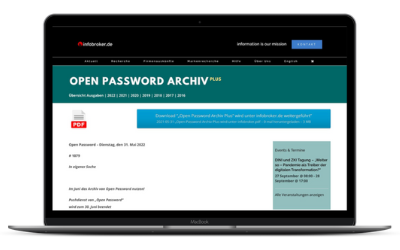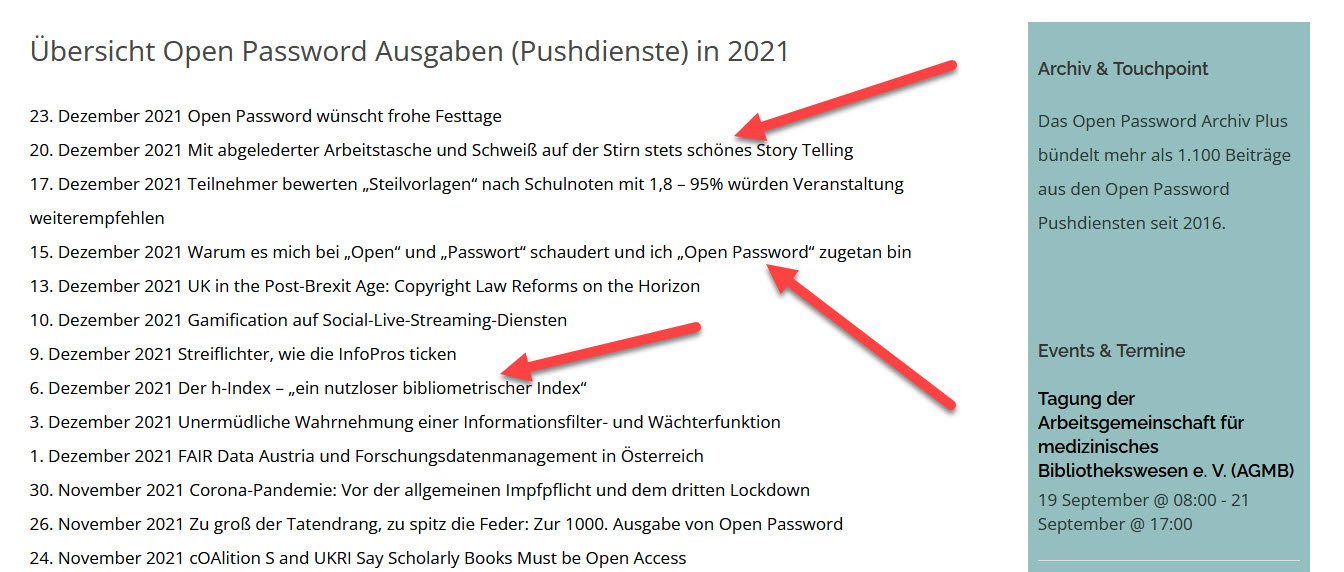Open Password – Mittwoch, den 18. August 2021
# 962
BIIA – Experian – Sustainable Future Worldwide – Financial Health – Lloyd Pitchford – Financial Inclusion – Financial Literacy – United Nations – Sustainable Development Goals – COVID Radar – Experian CORE – Vulnerable Communities – NGOs – Experian Boost – Serasa Score Turbo – Future of Information – Fairness – Social Innovation Products – John Hope Bryant – HOPE – Sustainable Business Report – Carbon Neutrality – Artificial Intelligence Conference on Search, Data and Text Mining – High Risk Area – Christoph Haxel – Postbank – Jugend-Digitalstudie – Smartphone – Laptop – Desktop-PC – Jungen und Mädchen – All-in-One-Lösung – Thomas Brosch – Tablet
BIIA`s August Contribution
How Experian is Building
a Sustainable Future Worldwide
Driving Innovation With a Social Purpose
(BIIA) Editorial Comment: There is a lot of talk these days about life after the pandemic for the population and businesses. Considering the current circumstances of the lingering pandemic, this would indicate that life after the pandemic will have to wait for a while longer. There is talk of likelihood of the pandemic becoming endemic, which means Covid-19 may soon be classified as a flu. Thus, focusing on personal health will continue to be the new normal, along with serious discussions about the financial health of people, businesses and governments. The Pandemic has done a lot of financial damage and it is time to focus on financial health and a sustainable future.
In this context we applaud a recent article by Lloyd Pitchford, Chief Financial Officer of Experian.
The following article was published on the Experian Global News Blog:
Lloyd Pitchford
“There are times in most of our lives where we can’t get access to the financial system in a way that we want. Be it for a mortgage, a car, or a business loan. We’ve all experienced the frustration when you feel you’re on the outside of the system and you can’t do the things you want for yourself or your family. At Experian, it’s our job to change that. We want to make sure everybody is included and has access to fair and affordable financial products.
Financial inclusion is fundamental to our business. With our focus on increasing access
to financial services, improving financial literacy and confidence, and helping people manage their financial lives; we help power people and businesses to create their future.
In fact, the United Nations includes access to financial services, such as credit and microfinance, among its Sustainable Development Goals. Access to affordable credit opens the door to opportunities for people to transform their lives – from homes and healthcare to education and entrepreneurship.
This has never been more important than it is today.
__________________________________________________________________________________
Creating a Campaign to Drive Financial Health Worldwide
_________________________________________________________________________________
As the pandemic took hold in 2020, we stepped in with data and analytics to support governments, health services and national emergency response efforts through major initiatives such as COVID Radar in Brazil and Experian CORE (COVID Outlook & Response Evaluator). These are just two examples of how we can use our data and expertise to make the biggest difference to society.
It soon became clear that the impact — not just on physical health, but on financial health — would be far-reaching for people around the world. We looked at how we could use our expertise and resources to help vulnerable communities through the crisis and focused on financial education as the best way to strengthen their resilience and support their
road to recovery.
We launched our United for Financial Health programme. We rapidly established 11 NGO partnerships across our biggest consumer markets to deliver targeted financial education for some of the communities hit hardest by COVID-19. By the end of the year, we had reached nearly 35 million people, more than double our original goal of 15 million, and we’re not stopping there. We aim to reach 100 million people by 2024.
Part of our efforts include our member relationships around the world. This year, we surpassed the milestone of 100 million direct relationships with consumers globally and delivered further innovations to support people through our business, with the launch of products like Experian Boost in the UK and Serasa Score Turbo in Brazil. This, of
course, is on top of our groundbreaking Experian Boost launch in the United States a few years ago. Our goal is to have a direct relationship with as many people as possible; to truly become the Consumers‘ Credit Bureau and power financial opportunities for all.
__________________________________________________________________________________
Driving Innovation with Social Purpose
__________________________________________________________________________________
Our culture of innovation helps us harness opportunities to drive business growth. We are continually investing in product innovation and new sources of data to address emerging market opportunities that can make a real difference to global communities.
In 2020, around 1,000 ‚innovators‘ from across Experian joined our annual Future of Information Conference – which was held virtually because of the pandemic – to encourage them to think differently in their work. Topics included fairness in artificial intelligence, transforming agribusiness and enhancing the consumer healthcare experience. Teams at our Data Labs in Brazil, Singapore, the UK and the USA tap into our culture of innovation to continually create new solutions to global challenges.
The result of all this is that our Social Innovation products have now reached 61 million people since 2013. We aim to reach 100 million by 2025.
As John Hope Bryant, CEO of one of our NGO partners Operation HOPE, says, ‚Experian’s commitment to unlocking the power of data to create opportunity means more people will be set up not just to survive, but to thrive in the months and years to come.‘
In this year’s Sustainable Business Report our commitments come through stronger than ever.
We are raising our ambition and aiming to reach 100 million people through our social innovation products by 2025; Our goal is to reach 100 million people through our United for Financial Health campaign by 2024.
We have also pledged to protect our planet by becoming carbon neutral in our own operations by 2030. We know we’ve got more work to do and we remain focused on using our business to make real and sustainable change. With social innovation running so deeply through the core of our culture, and our commitment to improving global financial health front and center of our thinking, we will continue to push to find new solutions to help people, serve communities and protect the environment, helping to create a better future for all.
All of this is very personal to me. I passionately believe we can and should drive to make a difference in society. I serve as executive sponsor of our ESG programs and this isn’t just another corporate program, it’s at the heart of what we do as a company to power financial opportunities. My personal pledge is to continue to keep you updated, as we
progress our agenda to sustainable environmental and societal change.”
BIIA (Business Information Industry Association) is the international co-operation partner of Open Password.
Artificial Intelligence Conference
on Search, Data and Text Mining
For Germans Only Virtuality
The Artificial Intelligence Conference on Search, Data and Text Mining, Analytics and Visualization.4th – 5th October in Nice
Dear Colleagues,
There are no good Corona news from the Côte d’Azur … the German Government has declared the area as a high risk area. That means that attendees from Germany must stay a minimum of five days under quarantine upon return. That explains why I have received only registrations for a virtual conference and most probably “The show must go on-line – again”. This encouraging phrase from show biz tells us that whatever has been planned or scheduled must be carried out, no matter what obstacles have gotten in the way. Nothing’s gonna stop us now …
The program is looking good. Book now and save some money … Super Early Bird Registration ends at the end of August. More info @ www.ai-sdv.com
Kind regards Christoph Haxel
Dr. Haxel Consult, Friesenberg 1 // 69117 Heidelberg // Germany, www.drhaxel.com,
Phone: +49 (0)6221 6505970 // Mobile DE: +49 1754110101
Postbank Jugend-Digitalstudie 2021
Im Schnitt mehr als 70 Stunden pro Woche
im Netz
(Postbank) Die Internetnutzung der deutschen Jugendlichen bleibt in der Corona-Krise auf hohem Niveau. 16- bis 18-Jährige verbringen im Schnitt 70,4 Stunden pro Woche online und damit nur 1,1 Stunden weniger als im Vorjahr. Zum Vergleich: 2019, also vor der Pandemie mit Lockdowns und Homeschooling, waren es noch 58 Stunden. Das geht aus der repräsentativen Jugend-Digitalstudie der Postbank hervor.
Von allen Geräten mit Internetzugang ist die Nutzung des Smartphones am weitesten verbreitet. Neun von zehn Teenagern verwenden es zum Surfen. Besonders beliebt ist das Gerät bei Mädchen: 95 Prozent von ihnen gehen damit online, aber nur 88 Prozent der Jungen. Hinter dem Handy folgt der Laptop, den 53 Prozent nutzen. Im Vorjahr waren es noch 67 Prozent der Jugendlichen. Auch die Beliebtheit des Desktop-PCs sank um neun Prozentpunkte auf 34 Prozent. Bei dem stationären Computer zeigt sich ein klarer Unterschied in der Beliebtheit bei den Geschlechtern: Während nur 18 Prozent der Mädchen das Gerät nutzen, sind es bei den Jungen 48 Prozent.
__________________________________________________________________________________
Smartphones als All-in-One-Lösung
__________________________________________________________________________________
Die Vormachtstellung des Smartphones zeigt sich auch in der Intensität der Internetnutzung. 43,7 Stunden pro Woche surfen Jugendliche mit ihren Mobilgeräten. Das sind rund drei Stunden mehr als noch im Vorjahr – da waren es 40,9 Stunden. Mit deutlichem Abstand folgen Laptops und Desktop-PCs. 16- bis 18-Jährige gehen damit pro Woche 8,8 beziehungsweise 8,0 Stunden ins Internet.
„In der Corona-Krise hat sich das Leben auf den Bildschirm verlagert. Teenager sind ohnehin online aktiver als Ältere – etwa in den sozialen Medien.
„Die Nutzungszeiten sind mit Krisenbeginn in die Höhe geschnellt; in diesem Jahr beobachten wir, dass sie auf hohem Niveau verharren“, sagt Thomas Brosch, Leiter Digitalvertrieb der Postbank. „Auch wenn sich die Jugendlichen nach der Krise wieder etwas mehr vom Bildschirm lösen werden, dürfte die Bedeutung des Smartphones bleiben. Insbesondere für junge Menschen ist es zur All-in-one-Lösung geworden, die für sämtliche Online-Aktivitäten zum Einsatz kommt. Unternehmen werden sich weiter darauf einstellen müssen.“
__________________________________________________________________________________
Tablets werden für schulische Zwecke wichtiger.
__________________________________________________________________________________
Wie im Vorjahr nutzen die Jugendlichen das Internet pro Tag im Schnitt 3,6 Stunden für berufliche oder schulische Zwecke und damit 1,1 Stunden mehr als noch 2019. Hier halten sich Smartphones (1,3 Stunden pro Tag) und Laptops (1,1 Stunden pro Tag) in etwa die Waage. Mehr Bedeutung für die schulische und berufliche Nutzung als noch im Vorjahr haben Tablets. Im Jahr 2020 nutzten Jugendliche solche Geräte 0,4 Stunden pro Tag. Im aktuellen Untersuchungszeitraum sind es 0,7 Stunden täglich.
Für die Postbank Jugend-Digitalstudie 2021 wurden im Mai und Juni dieses Jahres 1.000 jugendliche Deutsche zwischen 16 und 18 Jahren repräsentativ befragt.
Open Password
Forum und Nachrichten
für die Informationsbranche
im deutschsprachigen Raum
Neue Ausgaben von Open Password erscheinen dreimal in der Woche.
Wer den E-Mai-Service kostenfrei abonnieren möchte – bitte unter www.password-online.de eintragen.
Die aktuelle Ausgabe von Open Password ist unmittelbar nach ihrem Erscheinen im Web abzurufen. www.password-online.de/archiv. Das gilt auch für alle früher erschienenen Ausgaben.
International Co-operation Partner:
Outsell (London)
Business Industry Information Association/BIIA (Hongkong)
Anzeige

FAQ + Hilfe



